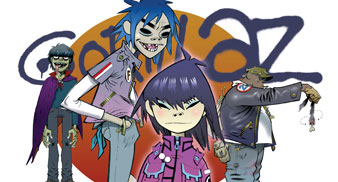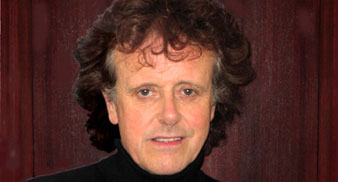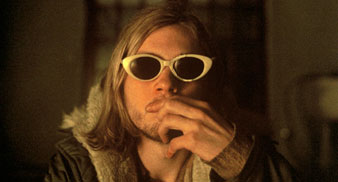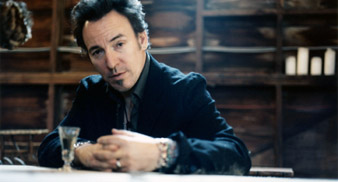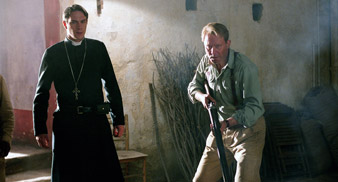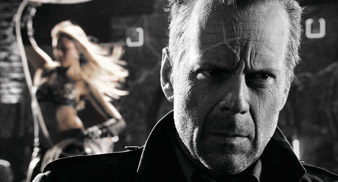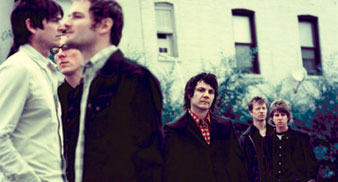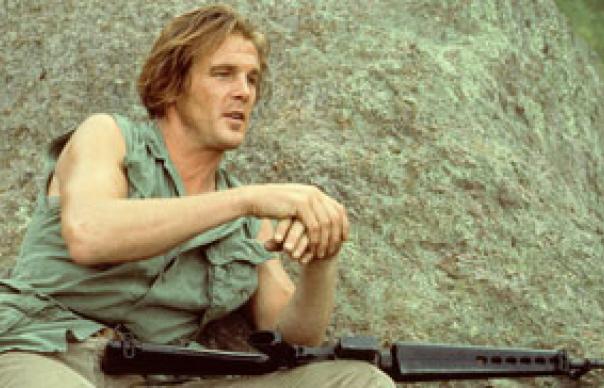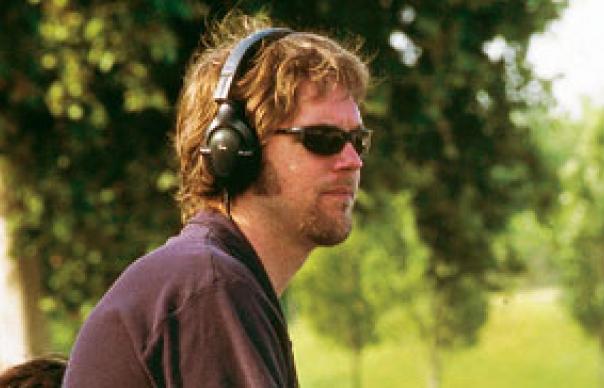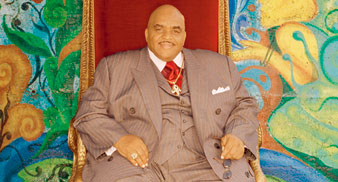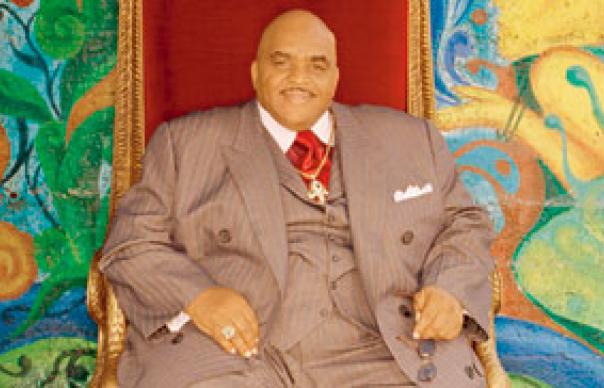The celebration starts here with EMI’s release of his four, truly classic and remarkably consistent albums from the second half of the decade: Sunshine Superman, Mellow Yellow, Hurdy Gurdy Man and Barabajagal. A mid-price reissue of Sanctuary’s Summer Day Reflection Songs anthology gathers up all his recordings from 1965 alone, two albums, What’s Been Did And What’s Been Hid and Fairytale, three hits singles and a chart-topping EP. Whatever else, the ’60s was no place for slackers.
Donovan is also about to embark on his biggest UK tour in three decades, a full month of dates commencing May 11 and, come September, Random House will publish his autobiography, only covering the ’60s, The Hurdy Gurdy Man. A figure whose patchy career since the ’60s has often seen him overlooked and undervalued, Donovan today manages, with no small amount of charm, to combine a raggle-taggle hippie persona with a strong line in self-publicity.
Is the legacy of the ’60s so strong as to be overbearing and to a point where it overshadows anything you‘ve done since?
The ’60s cast a long shadow but that’s no bad thing. It was such an amazing creative decade that it’s a hard act to follow for any generation coming after it. So much happened but I don’t feel stuck in the ’60s. I’m proud to have been part of that. I achieved all I set out to do by 1969 but, of all the things, the most important was helping to bring meaning and lyrics into the charts, taking songs of civil rights and protest and taking poetry into the charts. That generation changed the cultural landscape through ideas and songs about inner discovery, spiritualism, mediation, yoga, ecology, feminism. I shared this mission with Dylan and The Beatles, among others.
How easy was it to break from the shackles of being a pop star and, in your case, the folk tag.
I didn’t have to try. The reason I was so diverse was that I got bored if I did the same thing again and again. I think that’s why I’m so hard to place in history – because I didn’t stand still. I wasn’t simply a folk musician or a pop musician. Music is like modern art, it’s about constant expression, part of a bohemian theme and its death to repeat yourself, so I never repeated myself. Each single, each album track, would be as different as I could make it.
Even on the early albums you were embracing jazz and elaborate arrangements?
The songs were written that way. I heard the sounds that went with them as I wrote them. Classical musicians say the same thing; that in composing with one instrument they hear all the other instruments. That’s what happened with me, whether it was jazz or blues or more elaborate orchestrated arrangements. I heard all those things at once so it was never hard to be diverse – it was essential. One thing about the ’60: there was a freedom that not only allowed you to be diverse, it required you to try something new, to experiment. You had to keep coming up with new ideas to keep up with everyone else. It changed every month and the songs reflected those changes.
What was Mickie Most’s role? He must have allowed you that freedom to try such expansive ideas on your albums.
Mickie Most was integral. He could hear what I was trying to do which is why he said we’d better get an arranger and he introduced me to John Cameron. Mickie would pick the singles and he would work on them and he’d leave the album tracks to John Cameron, the master arranger, and I. John and I would cook up what we would call mini-soundtracks – soundtracks to my poems… you could close your eyes and you’re in a movie on songs like “Celeste” or “Guinevere “. I would hear harpsichord so John would work out a score to include harpsichords.
That is not to say that Mickie did not produce the album tracks. Mickie would say, ‘You need to thin it down’ so that my vocal, my poetry and the guitars were up front. At times our arrangements would get carried away, would be too busy, and Mickie would thin them out. Mickie had that perspective; he knew not just how to make hit records but how albums should sound. I thank Mickie so much for this.
Also this is not to say that I did not work on the singles. I learnt the art of singles composition from listening to Buddy Holly and the Everly Brothers and The Beatles and countless other pop records. Mickie taught me the sequence of verses for singles and I had already learnt a close mic technique which Mickie and I then developed.
Was Sunshine Superman your Sgt Pepper?
My arse was being sued by Pye after Sunshine Superman so Sunshine Superman, my masterwork, sat on the shelves for seven months. If you date it, it was at least a year and a half before Sgt Pepper and I remember Mickie saying to me, ‘Don’t play it to McCartney’ but of course everybody was sharing with everyone else and nicking from each other. I played it to McCartney anyway. But they were already there, anyway, and George Martin was doing something similar with The Beatles, working out arrangements from ideas they had in their heads. George Martin was The Beatles’ guy and John Cameron was my guy and they both had an appreciation of jazz which was key.
There’s a current vogue for recreating classic albums in their entirety. Would you consider doing that with Sunshine Superman?
I’d love to present Sunshine Superman onstage to highlight the possibilities of fusion for a new generation. It would be great to have younger players explore the work. It would be cool if some of the original cats were on stage from the session, too, though.
Did you teach John Lennon to play acoustic guitar in Rishikesh?
I played acoustic guitar continuously there and John, Paul and George only had acoustics with them. So we were all playing together throughout each day. John could already play acoustic guitar but I taught him finger style in India. He looked at me playing and said, ‘How do you do that?’ He really wanted to know and he learnt it really fast… It was a joy to teach him and we were very good friends as I was with all of them. I taught him the secret moves over two days. The first thing he wrote was the moving ballad to his mother, “Julia “. I helped him with the lyrics a bit as he said I was good at child songs. And he wrote “Dear Prudence” soon after learning the new style.
George had brought in Indian instruments to the ashram in Rishikesh and he gave me a tamboura, the Indian bass instrument. George wrote one of the verses for my song The Hurdy Gurdy Man and I played tamboura on the recording. It was two-way; I learnt from them and they learnt from me
We shared a common dilemma which was Super Fame but underneath we were still art students and in India we got a chance to be art students again. We all hung out with acoustic guitars. John used to draw, we’d mediate and there was no press, no media, no tours, no pressure, no fame. I learnt new styles as they did and their songwriting changed just as mine did. We’d play for hours on end and so much of this became part of The White Album. I’m proud to have influenced the White Album in any way.
The ’70s were less kind to you, though, weren’t they?
We were none of us ready for the impact on our personal lives.
In the ’70s I dropped out although I actually made nine albums which may sound contradictory but I didn’t promote them. Times had changed but we all had to grow up. We all realised that by the ’70s we were broke because everybody had thieved all the money. It’s ridiculous to say that because there was millions coming in but we were all so naïve and the deals were not structured toward the artists. Come the ’70s, we owed tax and had no money to pay it so we had to become businessmen.
Luckily I did have a publishing deal; the record deals meant for nothing. The reason McCartney or the Stones and The Who toured so much in the ’70s was because that’s where the money was for them playing huge stadiums.
That wasn’t for me. I didn’t want to continue, I’d done it all. My mission in the ’60s was to bring my bohemian manifesto into popular culture but by the ’70s all the bohemian ideas were out in the open and people could, if they wanted to, explore them.
In ’69 I walked away and luckily I ran into Linda. I’d met my muse, my Sunshine Supergirl, in 1965 but we then parted for three and a half years when she was with Brian [Jones]. But we came together at the end of the ’60s and thank God we did because none of the relationships of anyone I knew from the ’60s survived beyond the end of it. It was so hard because of the fame, the loss of private life. Fantastic professional success but personal disaster. That was the price we paid.
It was hard in the ’70s because I thought, What am I gonna do? So I kept making records but I didn’t want the pressure of touring, the danger of pushing and shoving to compete. I’d re-met Linda, the gal I’d fallen in love with in 1965, and we wanted to share our life together and start a family. We didn’t want to do that other thing any more. I made the records, I had a record contract that required me to, if nothing else, but in the ’80s I did less and in the ’90s I did even less recording until I made the Sutras album. I’ve made 27 albums to date but I feel I have a new lease of life now. I‘m enjoying the Beat Café tour I‘m doing now [in the States touring with John Mellencamp]. And we’re playing a lot of that classic ’60s material. I don’t feel I have to deny the ’60s any more.
It was so fast in the ’60s: five or six singles in a year and two, even three, albums in a year. No one thought it would last, just like a big flash in the pan. There was no precedent for it. Rock’n’roll in the ’50s hadn’t really lasted; its influence did. The reason it hasn’t gone away in one sense is that we ’60s artists rediscovered the roots of popular music and brought rhythm and blues and jazz to the front and those roots will never die.
You talked about your mission at 16. What’s your mission at 60?
My mission at 60, it’s the same mission. Leonard Cohen said that a poet finds his theme when he is in his teens and he never leaves that theme. Every song is a variation of that theme and mine was to present the possibilities of personal freedom. We are brought up conditioned, packaged and sold but if you can escape from the conditioning you can have true freedom of thought and expression. I think it’s the poets’ job to present these inner ways of change and that was my mission 40 years ago and the same today. That’s what I mean by Bohemia and what I’m presenting now, Beat Café, is a way of saying this is where it all came from.
The Bohemian scene of the ’50s prepared the fusion and it was out of those Bohemian Cafes, R&B and Jazz Clubs and literary and art school scene that Dylan, The Beatles and I came. We brought with us the boldness to change popular music for the better, linking the world through music. That’s the story of Donovan; that’s what the ’60s was about – change.


